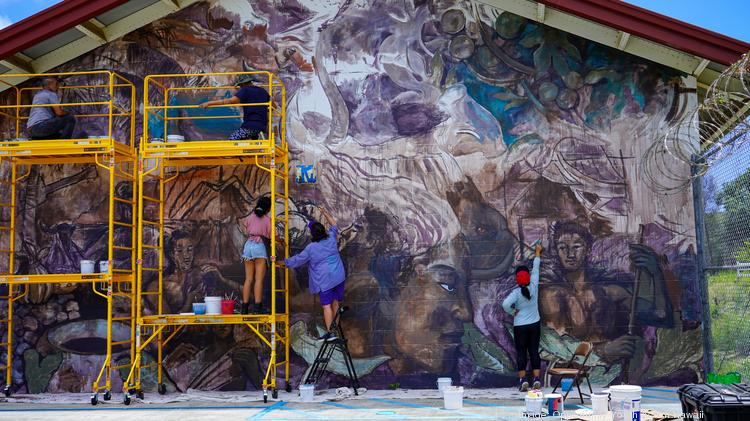Originally shared on Pacific Business News by Kelsey Kukaua on Oct. 11 2022, click here to read.
Michigan-based W.K. Kellogg Foundation has awarded Partners in Development Foundation $20 million dollars over an eight-year commitment for its project “Kawailoa: A Transformative Indigenous Model to End Youth Incarceration,” the Hawaii nonprofit announced Tuesday.
PIDF is among five global finalists of the foundation’s Racial Equity 2030 Challenge, which will award $90 million to help bolster programs that address racial inequities. Established in 1997, PIDF has served more than 128,000 people across the Hawaiian Islands.
“Each of the nonprofit organizations involved in this collaborative has to be scrappy to survive,” Shawn Kanaʻiaupuni, PIDF president and CEO, wrote in an email to Pacific Business News, “We exist on soft funds and work hard each year to provide programs and services dedicated to youth, alongside the state agencies that also provide funds for youth programs and services. These funds won’t replace these efforts, but the generosity of WKKF will help us expand the outreach and systems change opportunities, providing about 11% of the overall funding required for the next eight years to take us to 2030.”
“By committing our efforts together as a public-private partnership, we can turn to our Indigenous values and practices in the quest to end youth incarceration and create greater equity for Native Hawaiian and Pacific Islander communities,” she added.
Together, with The Opportunity Youth Action Hawaii hui, the Kawailoa youth campus offers “a place of peace, safety, and healing for Hawaii’s most vulnerable youth and young adults,” according to PIDF.
“Our Opportunity Youth Action Hawaii hui plans to host cultural exchanges and learning from other Indigenous and BIPOC communities for future innovations and positive results,” Kanaʻiaupuni said.
To date, Kanaʻiaupuni said Hawaii has reduced youth incarceration by 82%.
“We want to continue this work and take it to the finish line,” she said. “Our plan of action is to develop a proof of concept at the Kawailoa campus. This includes expanding programs and services for justice-involved and opportunity youth, supporting youth-friendly policy changes, like eliminating solitary confinement, aligning state budgets to support alternative programs, and shifting institutional practices and systems to adopt more therapeutic approaches.”
The Kawailoa project teaches Native Hawaiian youth about restorative systems, to empower and equip them with the skills needed for long-term success and independent living, while encouraging healing. The program also builds resources, capacity and support for kids and families within the community.
“What we learn in this process will help us identify ways to scale transformational change,” Kanaʻiaupuni told PBN.
“Ultimately, our goal is to see a Hawaii thriving with Native Hawaiian leaders, where youth incarceration is nonexistent and replaced with native ways of healing. We hope to share our data, research, and methodologies with other communities nationally and internationally who face similar challenges.”
She said as the youth go through the program, they look to pay it forward.
“They can take on the responsibility of healing by stepping into leadership roles, participating in service, and developing policies that impact their lives,” Kanaʻiaupuni said. “[They] pay it forward and become healers and apply their gifts to help others. … Entire communities also will benefit from their journey, which our collaborative hopes to support with alternative resources and training for students, law enforcement, public safety and community members and service providers.”
The Racial Equity 2030 Challenge, in partnership with Lever for Change, a nonprofit affiliate of the John D. and Catherine T. MacArthur Foundation, connects donors with those “solving the world’s biggest problems – including issues like racial inequity, gender inequality, lack of access to economic opportunity and climate change.”
The challenge launched in 2020, 90 years after the founding of the W.K. Kellogg Foundation, and received nearly 1,500 submissions from 72 countries around the world, PIDF noted.
“Partners in Development Foundation and the Opportunity Youth Action Hawaii collaborative already have a strong track record, and are continuing the work that has reduced the youth incarceration rate in Hawaii by 82 percent over the last decade,” said Ciciley Moore, senior program officer at the W.K. Kellogg Foundation, in a statement. “They’re replacing youth incarceration with culturally rooted programs aimed at healing, which is drastically cutting recidivism, especially among Native Hawaiian and BIPOC youth. We are proud to be partners for the next eight years.”
To learn more about PIDF’s Kawailoa project, visit wearekawailoa.org.
For more information about W.K. Kellogg Foundation’s Racial Equity 2030 Challenge, click here.

